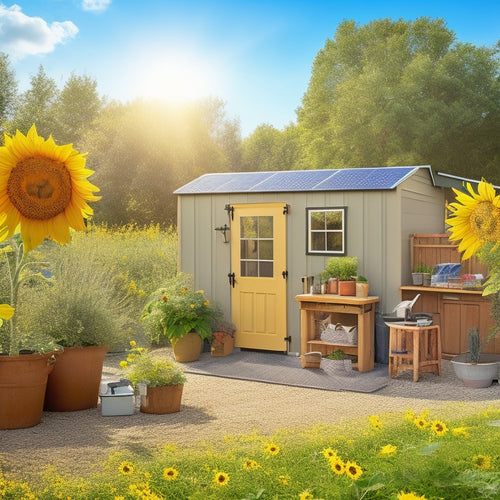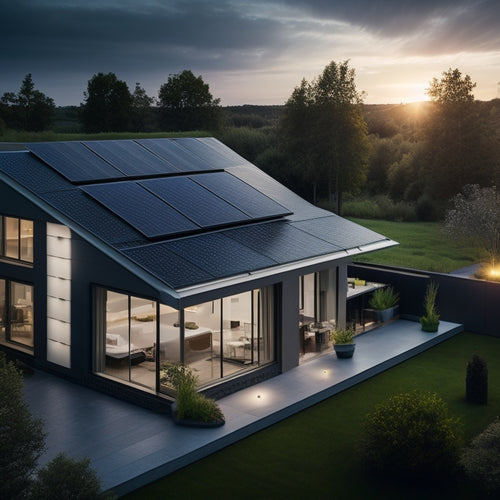
How Much Do Off Grid Solar Power Systems Cost
Share
Off-grid solar power systems generally cost between $10,000 and $30,000 for installation. This initial investment might seem high, but you'll experience significant long-term savings on monthly electricity bills. You'll gain financial independence from rising utility rates and contribute to environmental sustainability by reducing your carbon footprint. With options for financing and tax incentives, you can effectively manage your budget. Plus, selecting high-quality components can enhance system durability and lower maintenance requirements. If you're curious about maximizing your investment and system performance, there's more valuable information to investigate.
At a Glance
- Off-grid solar power system costs typically range from $10,000 to $30,000, depending on system size and components.
- Initial investment can be offset by significant savings on monthly electricity bills, averaging between $50 and $175.
- Financing options and tax incentives may reduce upfront costs, making solar investments more accessible.
- Long-term savings potential includes fixed energy costs that protect against rising utility rates over time.
- High-quality components and professional installation enhance system durability, potentially lowering maintenance costs in the long run.
Reduced Electricity Bills
Switching to an off-grid solar power system considerably cuts your monthly electricity expenses.
By utilizing renewable energy, you not only reduce your immediate costs but also reveal long-term savings potential as energy prices fluctuate.
With average monthly savings ranging from $50 to $175, investing in solar can be a financially savvy way to secure your energy future while also enhancing property value by up to 17% increased property value.
Ultimately, this shift offers a financially savvy way to secure your energy future.
Decreased Monthly Expenses
Embracing solar power can lead to significant savings on your monthly expenses, particularly in reduced electricity bills. When you install an off-grid solar power system, you're not just making an initial investment; you're also taking control of your energy consumption.
This independence means you're less susceptible to rising electricity rates and can effectively manage your monthly budget. While financing options are available to help you offset the initial investment, the real payoff lies in the reduction of your monthly expenses.
By utilizing the sun's energy, you can eliminate or drastically reduce your reliance on the grid. Imagine having the freedom to power your home without the burden of fluctuating energy costs.
Your system generates electricity, allowing you to enjoy a consistent and predictable monthly expense. This predictability enables you to plan for the future without fear of sudden spikes in your utility bill.
With each passing month, you'll notice the savings accumulating, giving you the financial freedom to invest in other areas of your life. Shifting to solar isn't just about energy—it's about embracing a lifestyle defined by autonomy and reduced financial strain.
Long-term Savings Potential
As you invest in an off-grid solar power system, you release considerable long-term savings on electricity bills, making it a financially savvy choice. While the initial investment and installation costs may seem noteworthy, various financing options and tax incentives can greatly reduce your upfront expense.
These incentives can enhance your return on investment, allowing you to recoup costs more quickly than you might expect. By eliminating your reliance on the grid, you gain energy independence, shielding yourself from fluctuating utility rates.
As electricity prices continue to rise, your fixed solar energy costs will remain consistent, leading to predictable savings over time. Plus, the scalability of solar systems means you can expand your setup as your energy needs grow, further improving your cost-effectiveness.
Ultimately, the long-term savings potential of an off-grid solar power system can be considerable. You're not just investing in a renewable energy source; you're investing in financial freedom.
Imagine the peace of mind that comes with knowing your energy bills are minimal, freeing up resources for other pursuits and securing your financial future.
Environmental Sustainability Advantages
Using off-grid solar power systems greatly reduces your carbon footprint, making a tangible impact on the environment.
By utilizing renewable energy sources, such as solar and wind, you contribute to a sustainable future while decreasing dependence on fossil fuels.
This shift not only benefits the planet but also enhances your energy independence, allowing for innovative energy solutions that promote self-sufficiency.
Reduced Carbon Footprint
One of the most enchanting advantages of off-grid solar power systems is their significant reduction in carbon footprint. By utilizing the sun's energy, you can eliminate your reliance on fossil fuels, which are major contributors to greenhouse gas emissions. This shift not only supports your desire for freedom but also embodies a commitment to a sustainable lifestyle.
When you convert to off-grid solar, you're actively engaging in carbon offset strategies. Each kilowatt-hour generated through your solar panels means one less kilowatt-hour drawn from carbon-intensive sources. This conscious choice enables you to reduce your impact on the environment while enjoying the independence that comes with off-grid living.
Moreover, as you invest in solar technology, you're not just making a personal statement; you're contributing to a larger movement for environmental sustainability. By decreasing your carbon footprint, you inspire others in your community to explore similar alternatives, amplifying the positive effects on our planet.
In essence, off-grid solar systems allow you to adopt a greener lifestyle while taking control of your energy consumption. It's about sustainable choices that lead to a cleaner, healthier future for both you and the environment.
Renewable Energy Sources
Shifting to renewable energy sources, like off-grid solar power, offers persuasive environmental sustainability advantages. By embracing technologies such as wind energy, hydro power, geothermal systems, and biomass energy, you can considerably reduce your reliance on fossil fuels. This shift promotes grid independence and enhances your energy security.
Here's a quick comparison of renewable energy sources:
| Energy Source | Key Benefits | Efficiency Level |
|---|---|---|
| Solar Power | High solar efficiency | 15-22% |
| Wind Energy | Reduces carbon emissions | 35-45% |
| Hydro Power | Reliable energy storage | 35-45% |
Implementing renewable technology not only mitigates environmental impacts but also enables you to utilize energy sustainably. With energy storage solutions, you can store excess energy for use during off-peak times, maximizing your system's effectiveness.
System Durability and Longevity
When considering off-grid solar power systems, understanding the lifespan of each component is essential for your long-term investment.
Off-grid batteries, such as SimpliPhi Power Lithium Batteries, are designed for high performance and long lifespan, making them an excellent choice for sustainable energy solutions.
Regular maintenance can greatly enhance durability, ensuring that your system operates efficiently for years to come.
Component Lifespan Factors
How can you guarantee the longevity of your off-grid solar power system? The answer lies in understanding the crucial factors influencing component lifespan. High component quality is non-negotiable; investing in premium solar panels, batteries, and inverters greatly improves durability. These components are designed to withstand the rigors of time and perform efficiently, even under challenging conditions.
Environmental conditions play an essential role in the lifespan of your system. If you live in an area with extreme temperatures, high humidity, or frequent storms, you need to choose components rated for those specific conditions. For instance, solar panels with strong weatherproofing can resist hail and high winds, while batteries designed for temperature extremes can avoid premature failure.
Additionally, consider installation quality. A professionally installed system minimizes risks associated with poor connections and inadequate support structures, both of which can compromise longevity.
Maintenance Requirements Overview
Regular maintenance is vital for guaranteeing the durability and longevity of your off-grid solar power system. By proactively monitoring and caring for your system, you can maximize its efficiency and lifespan, allowing you to enjoy the freedom that comes with renewable energy.
Start with routine inspections of solar panels, wiring, and battery systems to spot potential issues before they escalate. Cleaning your panels regularly guarantees maximum sunlight absorption, while checking connections helps prevent energy losses.
Pay attention to battery maintenance as well; keeping them charged and clean is essential for avoiding costly replacements. You may also want to evaluate periodic system upgrades to keep your setup current with technological advancements, enhancing performance and reliability.
When troubleshooting issues, don't hesitate to consult your system's manual or seek professional help. Quick resolution of problems not only saves you time but also safeguards your investment.
Selecting Based on Energy Needs
When selecting an off-grid solar power system, you need to start by evaluating your power requirements accurately.
Understanding how much energy you consume will guide you in determining the right system components to meet those needs effectively. This initial evaluation should include a detailed load calculation to identify the total wattage of appliances you plan to use, as proper system sizing guarantees reliability and prevents overload or underload.
Making informed choices here assures that your investment provides reliable energy without overspending, and you can find more on optimizing energy harvesting for your off-grid setup.
Assessing Power Requirements
Understanding your power requirements is crucial for designing an efficient off-grid solar power system, as it directly impacts both the system's capacity and overall cost. Start with a thorough power consumption analysis, where you list all your appliances and devices, noting their wattage and how many hours you use them daily. This data will help you gauge your total energy needs, allowing you to tailor your system accordingly.
Next, conduct an energy efficiency assessment to identify opportunities for reducing consumption. Consider upgrading to energy-efficient appliances or implementing smart energy practices. Every watt saved translates to less solar capacity needed, which can greatly lower your up-front investment.
As you assess your needs, remember that your lifestyle choices directly influence your energy consumption. If you desire the freedom of off-grid living, make sure your system can handle your unique demands without compromise.
The goal is to create a balance between your energy needs and the solar capacity available, ultimately leading to a sustainable, cost-effective solution that aligns with your vision of independence. This strategic approach will enable you to utilize the sun's energy efficiently.
Evaluating System Components
Selecting the right components for your off-grid solar power system is vital for maximizing efficiency and ensuring it meets your unique energy needs. When designing your system, focus on component compatibility to maintain peak performance. Here's a quick reference table to guide you in choosing the essential elements:
| Component | Key Considerations |
|---|---|
| Solar Panels | Wattage, efficiency, and space |
| Inverter | Type (string or micro), capacity |
| Batteries | Capacity (Ah), depth of discharge |
| Charge Controller | Type (MPPT or PWM), voltage rating |
First, assess your energy requirements to determine the wattage needed from your solar panels. Next, select an inverter that can handle your peak load, ensuring it aligns with your system design. For energy storage, batteries should provide sufficient capacity for your daily usage while considering their longevity and compatibility with your charge controller.
Lower Maintenance Requirements
One of the key advantages of off-grid solar power systems is their reduced routine checks.
With fewer moving parts and advanced technology, you'll spend less time monitoring and maintaining your system.
This not only frees up your time but also minimizes potential maintenance costs, making solar an efficient choice for your energy needs.
Reduced Routine Checks
When you invest in an off-grid solar power system, you'll quickly notice that it cuts down on routine checks and maintenance compared to traditional energy systems. Thanks to recent technology advancements, these systems are designed for durability and reliability, requiring minimal oversight.
With fewer moving parts and advanced materials, solar panels can easily maintain their system efficiency over time, reducing the frequency of inspections.
In contrast to conventional energy setups, which often demand regular servicing, off-grid solar solutions allow you to reclaim precious time and freedom. You won't have to worry about constant monitoring or unexpected repairs draining your resources. Instead, focus on enjoying the benefits of sustainable energy without the burdens of routine checks.
Periodic inspections are still recommended to verify everything is functioning at peak performance, but they're infrequent and straightforward. This means you can spend more time enjoying your independence, knowing that your off-grid system is working efficiently with minimal intervention.
Frequently Asked Questions
How Do Off-Grid Solar Systems Affect Property Value?
Off-grid solar systems can enhance property value through positive property appraisals, especially in areas with rising market demand for sustainable living. They signal independence and energy efficiency, appealing to buyers seeking freedom from traditional energy sources.
Are There Any Government Incentives for Off-Grid Solar Installations?
You'll find various government incentives for off-grid solar installations, like tax credits and local rebates. These options reduce installation costs, enhance system efficiency, and promote renewable energy, all while offering significant environmental benefits and financing opportunities.
What Is the Lifespan of Off-Grid Solar Batteries?
Off-grid solar batteries typically last 5 to 15 years, depending on battery maintenance and usage. Proper care maximizes energy storage capacity, ensuring you maintain your independence and enjoy uninterrupted power in your self-sufficient lifestyle.
Can Off-Grid Solar Systems Power All Home Appliances?
Yes, off-grid solar systems can power all your home appliances, provided their system capacity meets your energy needs. Achieving energy independence means carefully planning your setup to guarantee you utilize the sun's full potential effectively.
What Factors Influence Off-Grid Solar System Installation Costs?
Did you know that installation costs can vary considerably, often by 50%? Factors like system size, installation complexity, battery capacity, location factors, equipment quality, and maintenance costs all affect your total investment in off-grid solar systems.
Explore More
Investing in off-grid solar power systems can drastically cut your electricity bills while enhancing your home's sustainability. With their impressive durability and low maintenance requirements, these systems are built to last—think of them as the trusty steed in a world of electric chariots. By carefully selecting a system that matches your energy needs, you're not just saving money; you're also making a bold statement for the environment. Welcome the future of energy independence today!
Related Posts
-

Is This the Future of Alternative Energy Systems
Yes, alternative energy systems are shaping the future of energy. Innovations in solar and wind technologies are driv...
-

Building an Emergency Backup Solar Power System in 5 Essential Steps
Building an emergency backup solar power system involves five key steps. First, assess your daily energy needs to ide...
-

Home Solar Battery
You're opting for a home solar battery that allows you to utilize the power of the sun during the day and use it at n...


